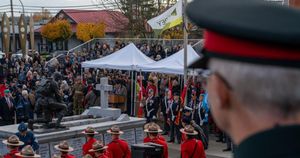Israel continues its relentless military campaign against Hamas as it faces increasing scrutiny over the humanitarian crisis developing within Gaza. Amid persistent fighting, the Israeli military announced on Tuesday it had delivered hundreds of food packets to besieged areas, striving to meet the determination of U.S. authorities to facilitate more humanitarian aid reaching the enclave before deadlines set by Washington.
Recent reports indicate a devastating toll on both sides. Palestinian medics have documented at least 24 casualties resulting from Israeli airstrikes across various regions of Gaza, which severely affect already destitute areas. The strikes include tragic incidents where entire families were wiped out, as was the case on Tuesday, when ten people reportedly lost their lives during strikes on Beit Hanoun.
The violence is not one-sided as noted by the Israeli military, which reported four of its soldiers were killed during conflicts inside Gaza, thereby emphasizing the gravity and complexity of the situation.
For weeks now, Israeli forces have imposed intense sieges, primarily around the northern regions of Gaza, including towns like Jabalia, utilizing this strategy to combat Hamas militants they claim are regathering strength there. Israeli officials assert significant casualties among Hamas fighters, citing the successful killings or captures of hundreds of militants during this sustained onslaught. Yet, these military actions have sparked international outcry due to the catastrophic humanitarian situation—over two million Gazans have been largely cut off from supplies of food, water, and medicine for weeks now.
Hussam Abu Safiya, director of Kamal Adwan Hospital, voiced severe concerns stating, “We are witnessing alarming cases of malnutrition among both children and adults. We are struggling to provide even one meal a day for our hospital workers amid severe food and medical supply shortages. We are losing lives every day due to the lack of specialized care and resources.” Abu Safiya, like many others, is caught between wrestling bureaucracies defending military actions and beleaguered citizens desperate for survival.
Parallel to Israel's push to expedite limited humanitarian supplies, it is also faced with increasing deadlines from the U.S.—a country historically allied to Israel but currently showing signs of impatience with the handling of aid access to Gaza. The Biden administration's support has remained strong, especially following the initial Hamas attack last October, which cost the lives of around 1,200 Israelis and took over 250 hostages. Yet, mounting civilian casualties—45,000 Palestinians estimated dead as reported by local health authorities—have strained relations, compelling U.S. officials to reevaluate the aid strategy as more bodies are unearthed from rubbles across Gaza.
Israeli authorities claim they are working swiftly to comply with U.S. demands, having opened another aid entrance, the Kissufim border crossing, to advance access to food, water, and medical supplies. But humanitarian organizations express scepticism, citing the scale of disaster is far beyond current efforts. “We need more. It is not sufficient considering the immense suffering on the ground,” added Dujarric.
The blocs between military operations and humanitarian aid pose serious complications for residents caught under siege. Aid amounts entering Gaza have plummeted drastically with many health experts warning of impending famine. The World Food Program voiced urgent concerns, noting October recorded the least amount of aid flowing through since the conflict's escalation, citing challenges due to both ground and aerial hostilities.
Results of recent assessments conducted by UN teams also highlight the struggle this enclave continues to face. Reports cite numerous families across the Gaza Valley whose requests for aid coordination were either blocked or delayed. Out of 98 access requests put forth by the UN Office for the Coordination of Humanitarian Affairs, only 15 gained approval, indicating significant hindrance on the ground for the humanitarian operations.
Palestinians are increasingly vocal against the aid deficiencies and the dangers posed by military actions. There is palpable despair among the populace, some expressing fears of dying of hunger rather than from conflict itself. Aisha Khaled, volunteering and precariously optimistic, voiced, “For me and for a million refugees, if the aid stops, we will end. We will die from hunger, not from war.” Her assertion resonates across many who are remarkably dependent on the limited aid dispersed by agencies such as UNRWA, which recently faced criticism from Israeli lawmakers who have passed legislation prohibiting the agency’s operations within territories held by Israel.
The UNRWA provides fundamental services like education and healthcare for the over two million Palestinians reliant on it, with many being sheltered within UN premises following Israel's aerial bombardment reducing homes to dust. Khaled's sentiments encapsulate the plight of many who cling to the fragile lifelines proffered through international efforts. “We depend on them after God,” she noted gravely, illuminating the juxtaposition of divine faith against the harsh realities of survival during the brutal conflict.
The U.N. stresses the need for the unrestricted flow of aid to avoid dire outcomes for the trapped population. While Israeli authorities claim aid continues to flow, the situation on the ground tells another story. The rhetoric of aid facilitation clashes with the lived experiences of Palestinians, as infrastructure remains battered, and families remain displaced, attempting desperately to find food and shelter amid ruin.
What’s clear is the overriding need for peace and humanitarian assistance for all involved, as the divisions continue to amplify, leaving countless humanitarian crises waiting for resolution and tangible discussions between the opposing forces struggling over land, identity, and survival. Until then, civilians will remain caught within this crossfire, struggling to reach out for basic assistance amid the chaos of conflict.



